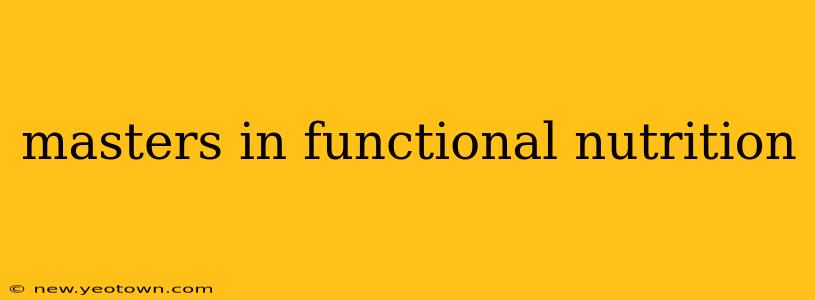The world of nutrition is evolving. Gone are the days of simply counting calories; today, a growing number of health-conscious individuals are turning towards a more holistic approach: functional nutrition. But what exactly is a Masters in Functional Nutrition, and what does it entail? This isn't just about learning the latest diet fads; it's about understanding the intricate interplay between nutrition and overall well-being, and empowering you to guide others on their path to optimal health. Let's embark on a journey to uncover the intricacies of this transformative field.
What is Functional Nutrition?
Imagine a detective meticulously investigating a crime scene, piecing together clues to solve a mystery. Functional nutrition operates similarly. Instead of focusing solely on treating symptoms, it digs deeper, seeking the root causes of health issues. It's a systems-based approach that examines the complex interactions between genetics, lifestyle, environment, and diet to understand why someone is experiencing specific health problems. This holistic perspective is what sets it apart from traditional nutritional approaches.
For example, instead of simply prescribing medication for high blood pressure, a functional nutritionist would investigate potential underlying causes like stress, gut health issues, or nutrient deficiencies. They might recommend lifestyle changes, dietary modifications, and targeted supplementation to address the root problem, leading to more sustainable and long-lasting health improvements.
What Does a Masters in Functional Nutrition Program Cover?
A Masters in Functional Nutrition is not a quick fix; it's a rigorous academic program designed to equip students with the advanced knowledge and skills necessary to become leaders in the field. The curriculum typically covers a broad spectrum of topics, including:
- Advanced Nutritional Biochemistry: Delving into the intricate biochemical processes within the body and how nutrients affect these processes.
- Gut Microbiome and its Influence on Health: Exploring the critical role of the gut microbiome in overall health and disease prevention.
- Functional Lab Interpretation: Learning how to interpret various lab tests to identify nutrient deficiencies, metabolic imbalances, and other health concerns.
- Hormonal Balancing: Understanding the complexities of hormonal systems and their impact on overall health.
- Chronic Disease Management: Examining the role of nutrition in preventing and managing chronic diseases like diabetes, heart disease, and autoimmune conditions.
- Integrative Medicine and Functional Approaches: Exploring how functional nutrition integrates with other holistic approaches to medicine.
- Clinical Practice and Business Management: Gaining essential skills for building a successful practice in functional nutrition.
What are the career opportunities after a Masters in Functional Nutrition?
The demand for qualified functional nutritionists is rapidly increasing. Graduates can pursue a wide variety of career paths, including:
- Private Practice: Establishing their own private practice to provide personalized nutritional guidance to clients.
- Corporate Wellness: Working with corporations to develop and implement wellness programs for employees.
- Research: Conducting research to further advance the field of functional nutrition.
- Education: Teaching and mentoring future generations of functional nutritionists.
- Consultations: Offering consultation services to healthcare professionals.
Is a Masters in Functional Nutrition right for me?
This advanced degree is ideal for individuals passionate about health and wellness who desire a deep understanding of the human body and its intricate relationship with nutrition. If you are a registered dietitian, a physician, or someone with a strong science background and a desire to help individuals achieve optimal health through a holistic approach, then pursuing a Masters in Functional Nutrition might be a rewarding path for you.
How long does it take to complete a Masters in Functional Nutrition?
The length of a Masters in Functional Nutrition program varies depending on the institution and the specific program structure. Most programs are completed within 1-2 years of full-time study, or longer for part-time study.
What are the prerequisites for a Masters in Functional Nutrition program?
Prerequisites vary depending on the specific program and institution. However, most programs require a bachelor's degree in a related field, such as nutrition, biology, or a related health science. Some programs may also require specific coursework or work experience.
This deep dive into the world of functional nutrition provides a comprehensive understanding of this rapidly growing field. It's a field driven by a passion for holistic wellness, a dedication to uncovering root causes, and a commitment to empowering individuals to take control of their health journey. If you resonate with these values, a Masters in Functional Nutrition may be the perfect path for you.

